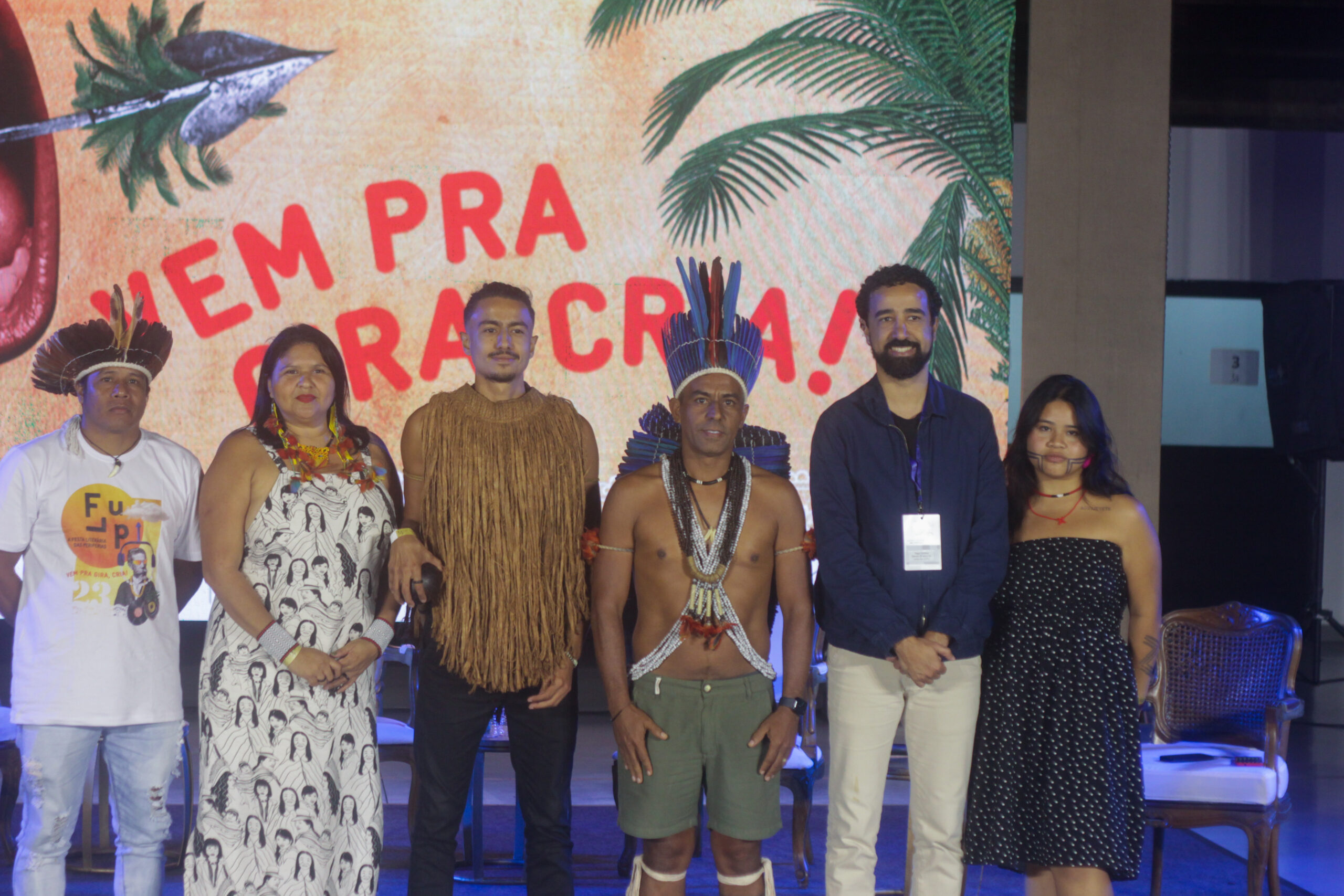
Clique aqui para Português
For Brazilian Black Awareness Month, this article covered Rio de Janeiro’s Urban Peripheries Literary Festival (FLUP) on pioneering Afro-Brazilian authors—the Black elders of Brazilian literature: Machado de Assis, Lima Barreto, and Mãe Beata de Iemanjá. FLUP held its 13th edition throughout 2023, in various phases of cultural occupation that took over Rio de Janeiro’s Little Africa. The opening was held on May 13, Day of the Black Elders and the Abolition of Slavery, celebrating ancestral orality under the theme “World of the word, word of the world.” The most recent events occupied the city’s Port Region from October 12-15 and 18-22. This year, FLUP unfolded across various spaces in Little Africa, such as Cais do Valongo, the largest port-of-entry to enslaved peoples in world history, Samol Arena, on Livramento Hill (a stone’s throw from Machado de Assis’s birthplace), the Gamboa Olympic Village, the “Ação da Cidadania” warehouse, and the “Viação Reginas” parking lot at the foot of Morro da Providência, the first community to be called “favela”.
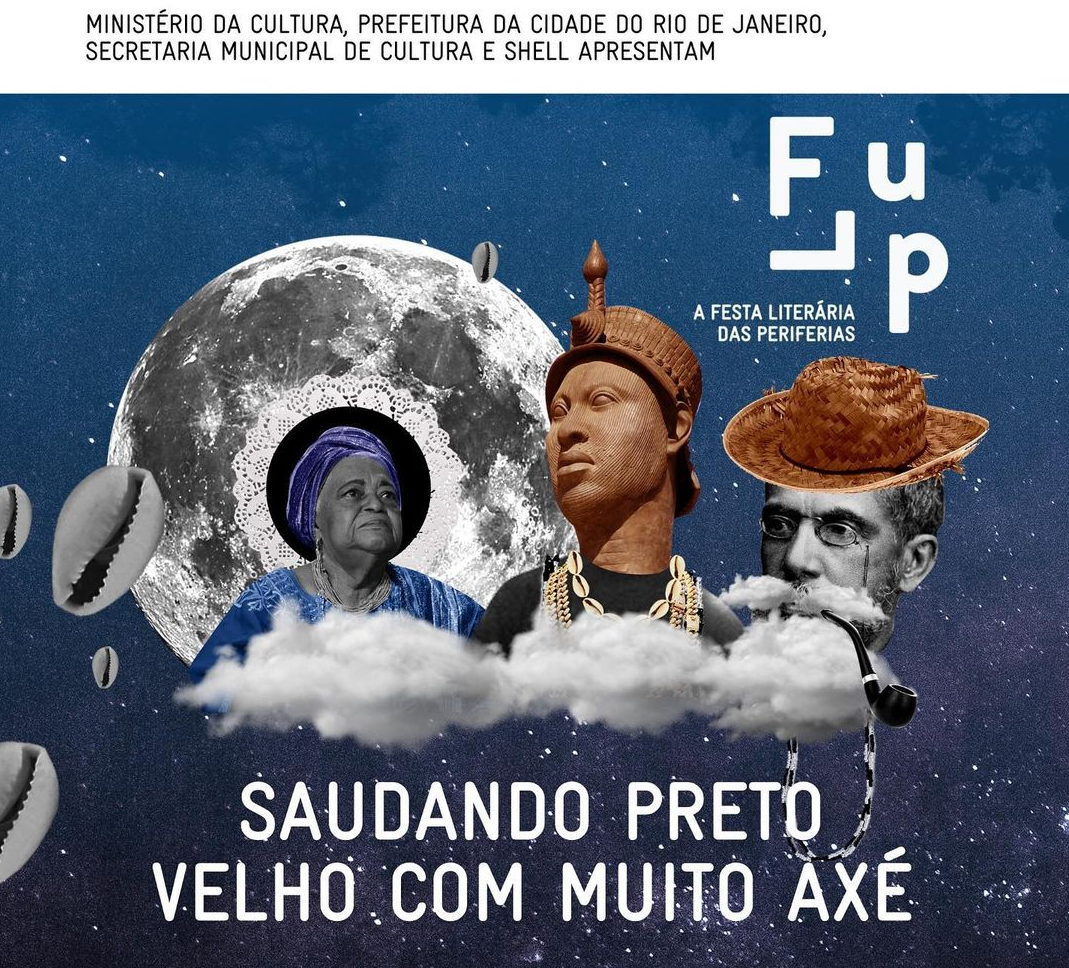
In this edition, FLUP pays tribute to the ancestral knowledge of the pretas and pretos velhos (Afro-Brazilian elders). Above all, to native of Livramento Hill, founder of the Brazilian Academy of Letters and Brazilian literature great Machado de Assis under the motto “Machado is Cria!”—a term used today with pride by favela residents to indicate they were born and raised in the favela. Lima Barreto and Mãe Beata de Iemanjá were also celebrated, the latter being an important author, religious and community leader whose actions were guided by environmental conservation, advocacy for human rights, and fighting sexism and racism.
On May 13, during the first phase of FLUP 2023, with around 3000 attendees, incarnated pretas and pretos velhos set the stage for what was to come, among them: Gilberto Gil, Haroldo Costa, Mãe Glória de Iemanjá, Conceição Evaristo, Nêgo Bispo, and Dona Zélia do Prato. High-level discussions were facilitated by important Brazilian Black women intellectuals, such as Flávia Oliveira and Eliana Alves Cruz.
The slogan “Join the circle, cria!” aimed to unify Afro-Indigenous ancestry, the literature and diversity of favelas and urban peripheries of Rio de Janeiro, Brazil and the world. The motto serves as an invitation, in good pretuguês (“Black Portuguese”), to those who want to celebrate our ancestors and elders in the literary terreiro (Afro-Brazilian religious grounds) of Little Africa.
Ver essa foto no Instagram
Join the circle, Cria! Forget the Machado de Assis they forced on you at school. He’s not the obscure intellectual from the South Zone. Meet the real Machado, born in the heart of Morro da Providência, a product of Livramento Hill, son of Maria and Francisco. He’s closer to our reality than they led us to believe. Machado, a revolutionary who witnessed the end of slavery, used his writing to challenge oppression with ironic realism.
In 1897, he co-founded the Brazilian Academy of Letters, the same institution that only saw another Black member in the 21st century. On May 13, FLUP 2023 honors the greatest Black writer ever, our very own Machado, with 13 hours of music, literature, Axé, and feijoada. We’ll name the reading room at Arena Samol the Machado de Assis Room, spreading his words to the children of Livramento Hill. Let’s multiply these Machado creations worldwide.
🍃 Join the circle, cria!
In its latest phase, spanning nine days with an extensive program, FLUP showcased performances by artists such as Leci Brandão, MV Bill, Xamã, Linn da Quebrada, Bia Ferreira, Mulheres na Roda, Teresa Cristina and Rita Beneditto. The event featured a special free showing of the award-winning play Monkeys and slam battles with national and international poets. Traditionally held in favelas like Prazeres, Mangueira, Chapéu-Mangueira, City of God, Vidigal, and Complexo da Maré, in 2023, the fair takes place in the Central region, in Little Africa—the birthplace of Brazil’s favelas, a Black ancestral territory bridging the formal city and the favela.
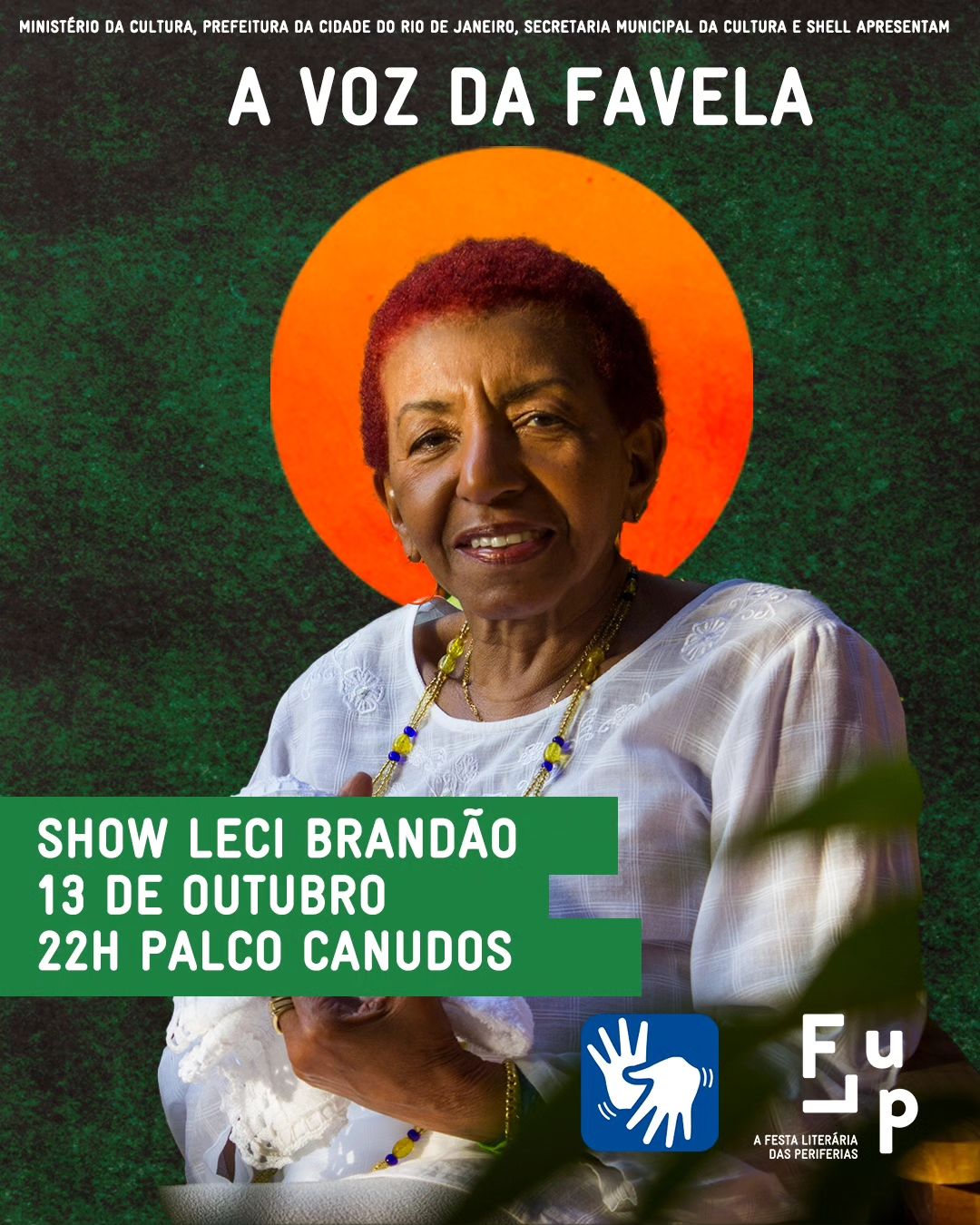
In this recent cycle of activities in October, various interventions occupied public and civil society spaces in Gamboa. Through diverse initiatives, the prominence or oral tradition in literature was reinforced. This article will focus on three specific events: Children’s FLUP, the lecture series “Global Peripheries: From the Margin to the Center of the World,” and “The Brazil of Quotas and UERJ’s Pioneering with 20 years of Affirmative Action Policies.” These discussions addressed themes celebrating achievements of the Black Movement, including 20 years of UERJ’s affirmative action policies and how these have also benefitted indigenous people, economically vulnerable individuals, and public schools students. Other topics included the 50 years of hip hop, the Canudos massacre, and the founding, 126 years ago, of Favela Hill, known today as Morro da Providência—a history rooted in the denial of the right to housing.
Ver essa foto no Instagram
October is right around the corner bringing that Flup 23 vibe! 🚀 On the 15th, at 3pm, we’ll dive into the wisdom of @ConceicaoEvaristoOficial, a beacon for our Black sisters in literature. 🔥📚 Plus, Nêgo Bispo @rocadequilombo brings his quilombola art, challenging our colonial perspective. A gathering of Axés that will resonate to the Aye! 🎤⚡ Let’s connect with our living ancestors and open pathways of our minds! Join the circle, cria! October is promising! 💥
Global Peripheries
On October 16, within the Global Peripheries lecture series, a roundtable titled “Favela Hill: The Providência of Canudos” brought together key figures including photographer and Providência cria, Maurício Hora; João Batista S. Lima, Canudos cria, historian, and descendant of conselheristas (followers of Antônio Conselheiro, leader of the Canudos revolt); Luiz Torres, teacher, quilombola, and Providência cria; and Sílvia Capanema, teacher and researcher. During the presentations, their discussions delved into the direct relationship between Canudos and Morro da Providência.
“Consider this—100 years after the Canudos War (1898), a contact from UNEB (State University of Bahia) reached out, urging me to visit Canudos saying ruins were emerging. They built a dam to conceal the remnants of the war. By 1968, the dam was completed… and engineers anticipated it would fill in three to four years. To everyone’s surprise, it filled up in three days, overflowing on the fourth. So, a century later, as the dam dried up, the entire city resurfaced. It’s almost divine! UNEB conducted commendable archaeological work. When I caught wind of the news, I thought, ‘I have to go!’ Regrettably, I ended up not going due to financial constraints…” — Maurício Hora
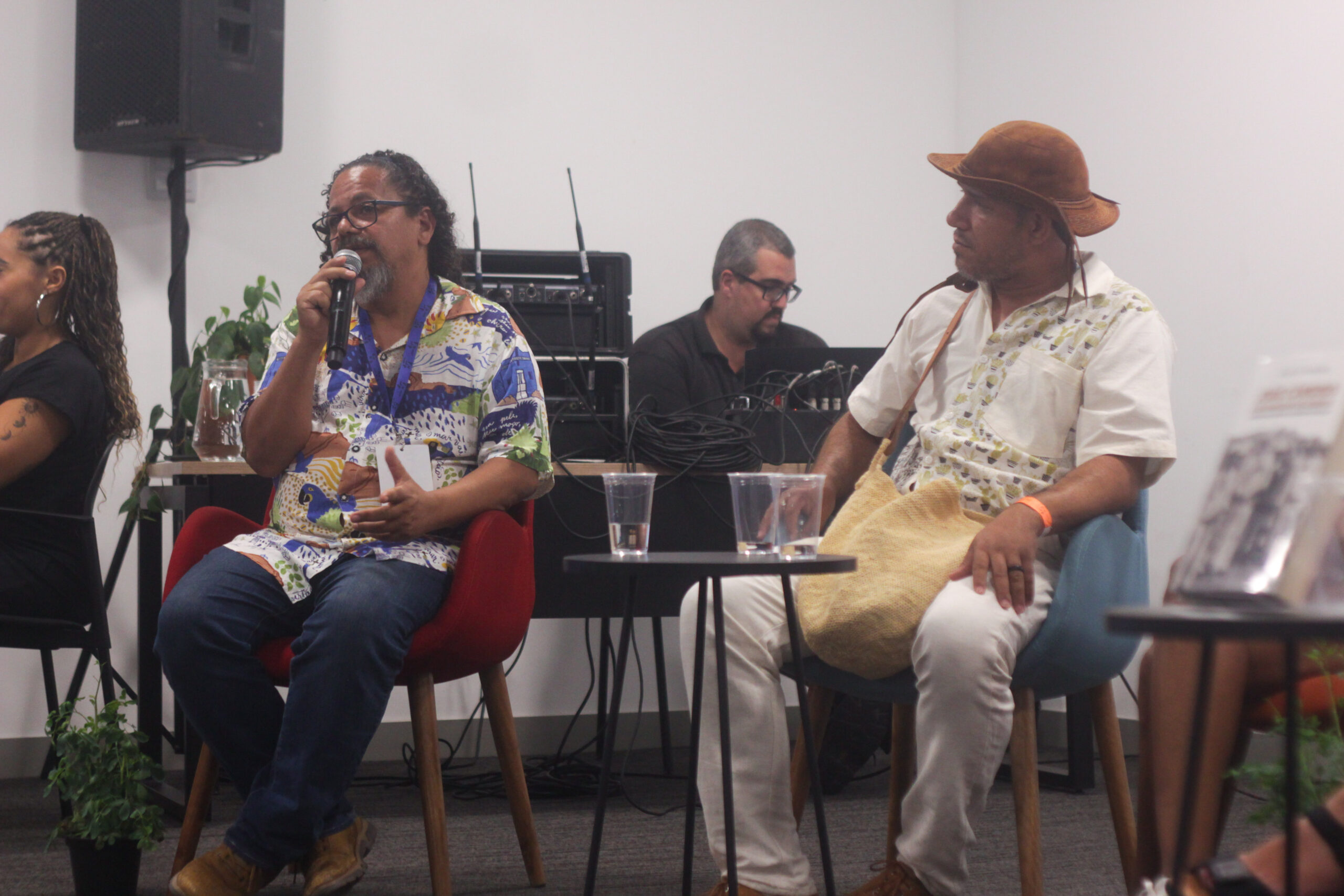
João Batista, a historian and tour guide in Canudos, spoke on the perspective of the canudenses (residents of Canudos) on the history of the war, the society that flourished there and the legacy of the conselheiristas.
“I’d like to start out by reading a few verses… that say the following:
‘A bloody earth flooded the sertão
shattering a communal dream,
erasing the hope of a warrior people and of freedom.The sertão turned into a sea of blood; the blood soaked the ground,
the caatinga wept for our people, and in its bareness, it screamed we are all brothers.Canudos’ harrowing massacre scarred the nation,
coronel, generals and soldiers with the same vision:
to erase the utopia of a heart.The sertão turned into a sea of blood, and the blood soaked the ground,
the caatinga wept for our people, and in its bareness, it screamed we are all brothers.
The sertanejo is strong, facing the drought, pleading to God for providence,
the rain that comes brings hope, washing away the thunder.’The war has passed, years have gone by, never forgetting the Canudos of yore. It will be remembered once again in a song of love, justice and peace, and all united in one same direction will proclaim, never again war. The sertão is a sea of dreams, hope and redemption. The caatinga fills life with enchantment.” — João Batista
Still as part of the Global Peripheries lecture series, the October 19 panel, titled “Spoken Languages, Spoken Worlds” featured the participation of rapper, poet and composer Carol Dall Farra; cordelista (a practitioner of a Brazilian folk literary form called ‘cordel’), poet and actor Edmilson Santini; writer and poet Mauricio Acuña; and writer Natalia Ospina. The discussion delved into various forms of language, art and culture across global peripheries. Edmilson Santini told his story using cordel techniques at various moments, reflecting on the significance of his origins in shaping who he is today.
“I was raised in a circle of ‘cordel’ storytelling. My grandfather was called the ‘pajé do sertão’; he lived on a farm on the border of Alagoas with Pernambuco, in a place called Canapi. Today, with ‘cordel’ as an intangible heritage, I live like this—my greatest intangible heritage was my grandfather.” — Edmilson Santini
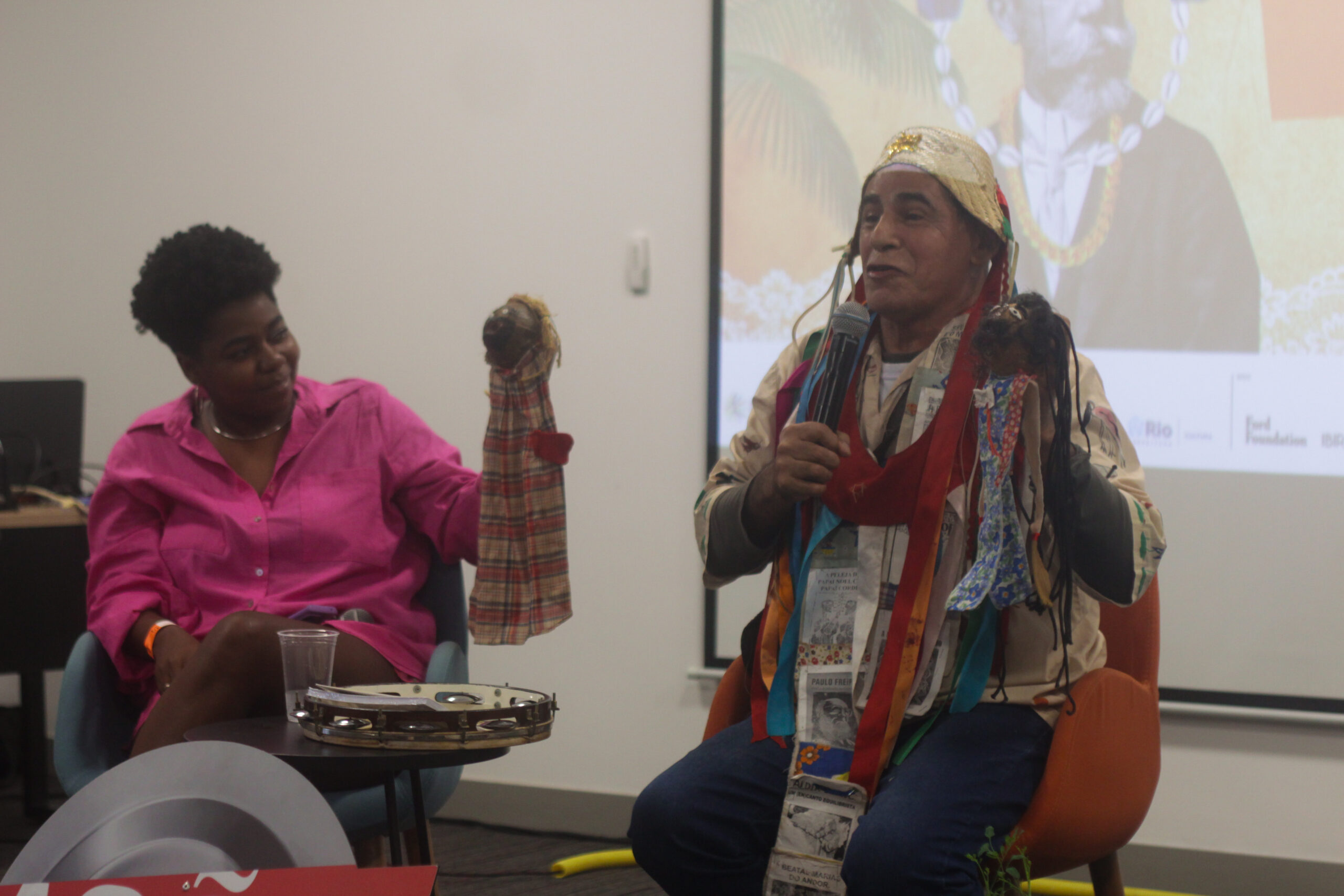
“I remember that I wrote a lot because my mother read a lot. My mother is a woman who didn’t even finish high school, but was an avid reader… she not only read, but would laugh out loud, she externalized things. So, I would catch my mother crying a lot and, sometimes, laughing a lot, always with a coffee and a cigarette in her hand… I would observe that, even before I knew how to read. I was very intrigued.” — Carol Dall Farra
Ver essa foto no Instagram
My terreiro’s ground is the world’s navel 🌍! Providência turns into a global crossroads, spotlighting Afro-Carioca culture in the ‘Global Peripheries’ lecture series. Straight talk on memories, racial quotas, hip-hop, and Morro da Providência’s history. Oct 13-22, in Brazil’s first favela. Join the circle, cria!
Children’s FLUP
On October 12, the program featured the distribution of 500 kites. Additionally, there was the event “Cria Carnival – Animal Carnival Parade,” presented by the Company of Mysteries and Novelties. Furthermore, Cine FLUP for Kids organized the AfroTomorrow workshop, led by filmmaker Eric Paiva, exploring afrofuturism for dozens of children attending municipal schools.
Ver essa foto no Instagram
“It’s Erês Day, Our Lady of Aparecida Day, and Flup Day! The Flup 23 opening is here, and we’re excited! We’ve planned and worked hard for a special Flup this year, featuring diverse discussions, straight talk, and fun activities for everyone. Join us for talks, performances, and a kids’ program over the two weekends. On this special day, honoring Children’s Day and Our Lady of Aparecida, we salute the strength, faith, and Erês. There’s something for everyone, so no excuses—come join the celebration! 🪁📿📚✨ #Flup23 #ChildrensDay”
During the workshop, Paiva addressed topics such as the use of artificial intelligence, ethical considerations in its use, and how it may impact Black and peripheral populations.
“I used to teach classes here in Providência… a good many years ago, when I was studying film… it’s always nice to come back to Providência… I’m also a ‘cria’ of the favela, so it feels like home… I was able to experiment [show the children] some videos I made. The reception was marvelous… In the end, a little girl came and gave me a hug.” — Eric Paiva
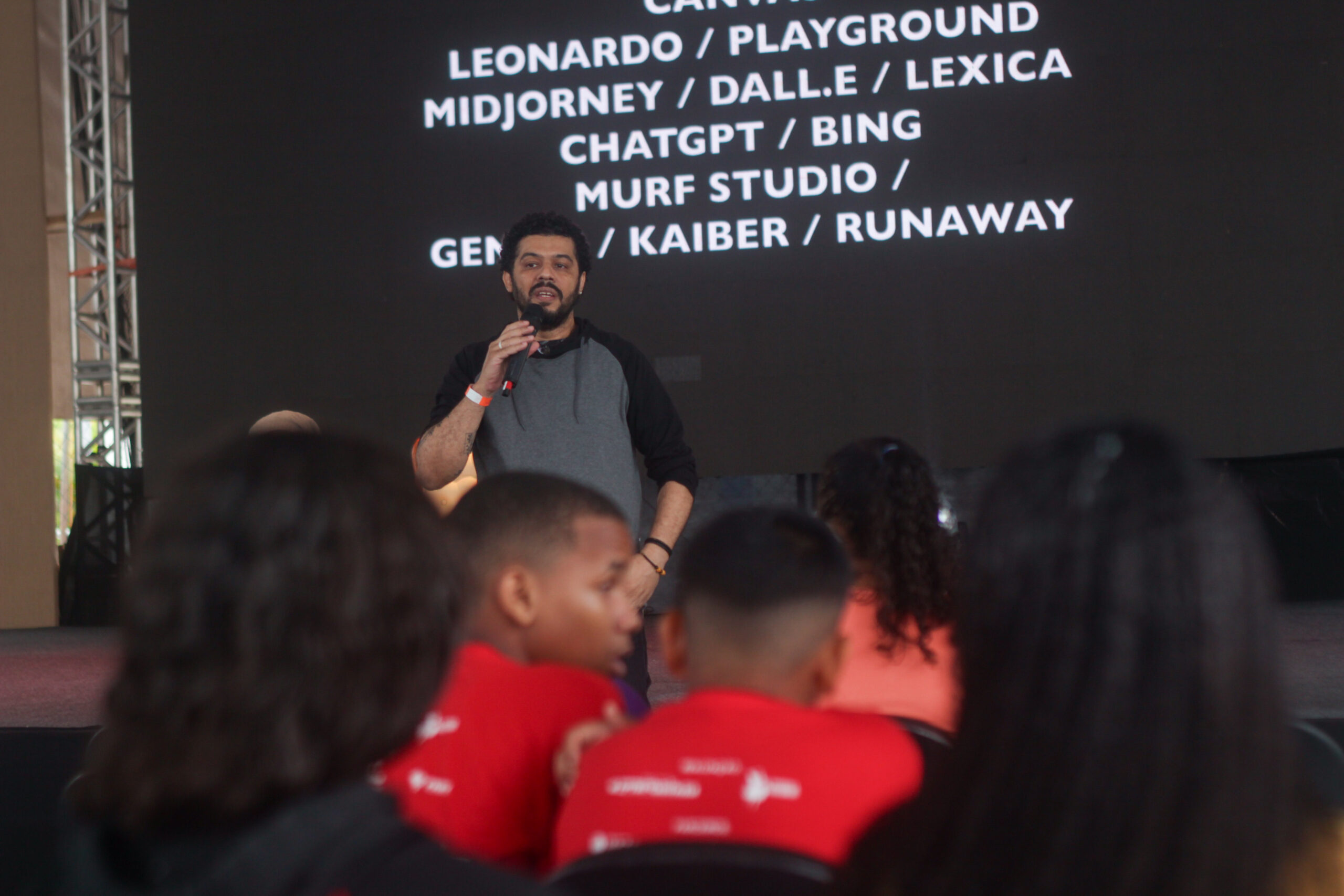
UERJ: 20 Years of Affirmative Action
A trailblazer in affirmative action implementation, the State University of Rio de Janeiro (UERJ) took center stage in a comprehensive lecture series at FLUP 2023. Panels and dedicated spaces were organized to discuss affirmative action quotas and the implications of these policies, which have been integral to the university for 20 years.
Ver essa foto no Instagram
📚 Diverse bodies, diverse wisdoms!
🗣 Straight talk: Those who always had university as an option might not fully grasp the profound impact affirmative action had on Brazil.
✊🏾 But you get it! Thanks to this policy, campuses not only became more diverse in students but also in knowledge, challenging the traditional white-centric understanding of wisdom and influence.
👉🏾 That’s the focus of our debate series, “20 years of quotas, affirmative actions, and UERJ’s pioneering role.”
Join the circle, cria!
On October 20, as part of the ongoing lecture series, a panel titled “University: Indigenous Territory” shed light on the impact of affirmative action on indigenous peoples in universities, with a focus on UERJ. The panel featured indigenous leaders Cacique Marcos Xukuru, Tayná Álvares (a UERJ student), and Wallace Amaral.
“UERJ was a pioneer in the affirmative action system. I think UERJ could take an additional step, considering those who live in [indigenous] villages and still speak their mother tongue. UERJ could prepare to be able to welcome and address accessibility for family members that live in their villages and who maintain this resistance. I think this would be a way of expressing that we are welcome and that we can occupy these spaces. — Tainá Álvares
Ver essa foto no Instagram
Today at Flup, the panel “University: Indigenous Territory” explores how indigenous communities use education as a tool, wielding the pen for rights and narrative ownership. Join the discussion at 4pm at Teatro Betinho, Ação da Cidadania. Join the circle, cria! 📚🎤🍃
Annually, FLUP reminds us that urban peripheries live, produce and consume culture. In a recent reality where a former minister suggested taxing and raising book prices, claiming books were exclusive to the upper class, the festival proves the exact opposite: that we consume books, movies, music, theater and much more. But that isn’t all, we also produce them, and they are, many times, the center of our culture.
Ver essa foto no Instagram
In nine days, Providência became a global crossroads, hosting poets from 40 countries and 5 continents. A celebration of Slam, hip-hop, ancestral orality, and spoken poetry unfolded on FLUP’s stages in Brazil’s first favela. From Conceição Evaristo to Emicida, the event featured a stellar lineup, including musical performances by Rita Benneditto, Leci Brandão, Teresa Cristina, and more. FLUP invites you to embrace diverse literary experiences, grounded in life’s essence, cultural beats, and a mosaic of voices—translating Machado de Assis’ Providência roots into a nation of creators. Thank you for joining the circle, cria! 💫
Even after the recent major events in May and October, FLUP is still going strong. Its ongoing and decentralized program carries the essence of a literary festival rooted in favela and urban periphery culture. On November 4, SESC Tijuca hosted a unique event—a dramatic reading circle of the work honoring Lima Barreto, produced and launched within the FLUP framework this year: Lima’s Quilombo.
Ver essa foto no Instagram
On Saturday, November 4, FLUP and Sesc Rio join forces to celebrate the book Lima’s Quilombo, the 30th in the festival’s history. Five of the 22 authors will discuss Lima Barreto’s legacy, marking a significant chapter in the renewal of Brazilian literature with Black, feminine, and non-binary voices. The event includes a dramatic reading directed by Márcio Januário and a Samba Circle featuring Brazilian samba classics. It’s a vibrant celebration of literary diversity and cultural richness.
Other than this, national and international slams marked FLUPs program over the course of the year, such as: the Rhyme Battle, promoted by FLUP in partnership with the Marginow Battle; the qualifying phase of the Poetry Slam World Championship; the International Trans Slam; the FLUP Girl’s Slam BR, organized by the Girls’ Slam RJ together with the literary fair; and FLUP’s Slam Coalkan, the world’s first indigenous slam bringing together indigenous artists that live in the intersection between the favela, urban periphery and indigenous villages.
Ver essa foto no Instagram
FLUP 23 is gearing up for the International Trans Slam on Saturday, October 21, in the heart of Brazil’s first favela. Organized by the Trans Slam Collective, this event brings together over 10 poetrans from different countries for a historic night of spoken poetry. Share the news with #TransSlamInternacional and join the circle for a memorable October night! 🏳️⚧️🌍🎤
In November, the fair continued supporting events of this kind across Brazil. From November 30 to December 3, FLUP helped organize Slam BR 2023 in the city of Itabira, in the state of Minas Gerais, at the Carlos Drummond de Andrade Foundation. It was a spoken poetry gathering with poets from 22 Brazilian states. The event was hosted by the SLAM MG team, which also featured film exhibitions, panel discussions, workshops, and even a seminar.
Ver essa foto no Instagram
The wait is over! Here’s SLAM BR 2023, being hosted for the first time in Minas Gerais from November 30 to December 3 at the Carlos Drummond de Andrade Foundation, in Itabira.
About the author: Vinícius Ribeiro was born and raised in the West Zone of Rio, and currently lives in Mangueira. Journalist, cinematographer and photographer, he is a member of the Fotoguerrilha Collective. He is director and screenwriter of short films Sobreviver, Dame Candole, Sob o Mesmo Teto and Entregadores, and is currently involved with a project about the Uberization and precarization of labor.
